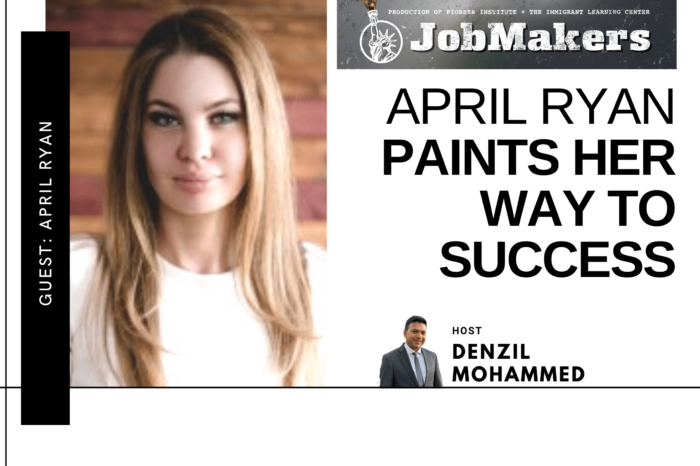April Ryan Paints Her Way to Success
/in Economic Opportunity, Featured, JobMakers /by Editorial StaffThis week on JobMakers, host Denzil Mohammed talks with April Ryan, immigrant from Russia, founder and CEO of Red Iguana nail art products, and influencer to hundreds of thousands. April came to the U.S. from a poor town, speaking no English, but through tenacity and inventiveness, she achieved success by creating video tutorials of nail art, and developing a breakthrough product that became a bestseller in 19 countries. April’s story is the immigrant story, about the kind of people who embark on the journey to America, and then put their pluck and ingenuity to use for the benefit of everybody, as you’ll hear in this week’s JobMakers podcast.
Guest
 April Ryan opened her first salon, naming it after her beloved pet, the Red Iguana, and has since become a successful influencer and entrepreneur in the DIY at-home beauty industry. Through the experience of creating nail art tutorial videos, she recognized a need for an affordable, realistic-looking silicone hand that would improve safety for nail professionals practicing under Ultraviolet lamps. Today, Red Iguana is on course to reach $5 million in sales. Silicone practice hands are its lead product, handmade in the U.S.A. for a range of skin tones, and sold in 19 countries.
April Ryan opened her first salon, naming it after her beloved pet, the Red Iguana, and has since become a successful influencer and entrepreneur in the DIY at-home beauty industry. Through the experience of creating nail art tutorial videos, she recognized a need for an affordable, realistic-looking silicone hand that would improve safety for nail professionals practicing under Ultraviolet lamps. Today, Red Iguana is on course to reach $5 million in sales. Silicone practice hands are its lead product, handmade in the U.S.A. for a range of skin tones, and sold in 19 countries.
Get new episodes of JobMakers in your inbox!
Read a Transcript of This Episode
Please excuse typos.
Denzil Mohammed:
I’m Denzil Mohammed and welcome to JobMakers
Denzil Mohammed:
Coming to the United States from nothing is not an uncommon story. After all. It’s the people with their backs against the wall who have to figure out a way to eat, feel safe and maybe just thrive. But America’s pot streets of gold provide a stark reality that newcomers to the country must reckon with, and then overcome for April Ryan immigrant, from Russia and founder and CEO of Red Iguana nail art products and nail art influencer to hundreds of thousands coming to the us from a poor town where growing up, her family had to grow the food. They ate the bright lights of Beverly Hills show that harsh reality. So many of immigrants face, nothing is given to you. You have to work to get it without a lick of English. April tapped into her tenacity and inventiveness. When she realized video tutorials of nail art could make her famous. She went all in. When she realized working on her hands for those videos repeatedly actually ruined her nails. She developed a breakthrough silicone practice hand, which became a best selling nail artist in now 19 countries. April’s story is the immigrant story and it shows just the kind of people who take that risk to move here and use their pluck and scrappiness to succeed. As you hear in this week’s jobmakers podcast,
Denzil Mohammed:
April Ryan CEO, and founder of red iguana, an immigrant from Russia. Thank you for joining us the job makers podcast. How are you?
April Ryan:
Good. And thank you for having me today.
Denzil Mohammed:
It’s it’s our pleasure. So tell us a little bit about your business. It’s a very unique business, but it’s certainly booming right now. And where did the idea come from?
April Ryan:
In the past, I’ve been a nail art creator and influencer, and I used my own hands a lot for videos, but after some time I started to see some damage of my skin because when I do nails, a lot, of course, you filing, you put your hands to UV light which is not good for skin. Right. And I started to, to talk like, what if I will have some model for my videos, but I really loved my hands. So I decided to try and create copies of my actual hands and created Silicon practice hands for nail artists, which is very popular right now.
Denzil Mohammed:
Wow. So, and then that took you like six months to perfect, right?
April Ryan:
Yes. It’s a long process. It’s not like you make it today and tomorrow it’s done. It’s a lot of details, a lot of things you need to follow and see if it’s working, especially from first tries. It’s never perfect. So right now working on certain generation of hands because it’s always some improvement in them.
Denzil Mohammed:
Oh, wow. That’s incredible. So you invented a Silicone practice hand for nail artists to practice on. That was, that’s a excellent idea.
April Ryan:
Thank you.
Denzil Mohammed:
But your business journey and your personal journey both started in Russia. What was life like growing up there? And did you have any good career prospects?
April Ryan:
So growing in Russia, especially in small towns is, was mine. It’s not easy because it’s not much resources for everything. So I started to be interested in beauty industry for about when I been 14 years young, but when you don’t have money, because it’s Russia, <laugh>, you don’t have money. You don’t have resources. You don’t have even ways to be closer to this industry because like where, where you will find it, if you in small city and it’s no schools, no stores, nothing even internet we had, you cannot even see what happens in the world because you don’t have good internet.
Denzil Mohammed:
I read that you, your family had to grow your own vegetables. You had to wear hand me downs from your brothers.
April Ryan:
Yes. Yes. Because it was the only way to get some food because like it’s endless financial crisis in Russia, no job, no money. And of course we had our own vegetables and livestock just to be able to eat something. And of course, when I don’t have money for new clothes I wore my brothers clothes because I had no, no, no choice. <Laugh> actually, but I’m not thinking about, about something bad because it’s, it’s made me stronger. And even now I have my, it helped me. I, and yeah. Just experience and so, yeah, good extra. So, yeah.
Denzil Mohammed:
So obviously there was no beauty school nearby, but then something happened when you were 18.
April Ryan:
Yes. my mom, she found like newspaper and let’s say that independent educator coming to our town with classes and she knew I left everything about beauty. And to said, you should try. And I tried, it’s been very, it’d be like one month’s paycheck cost. Yeah. But my dad helped me. He actually borrowed me this money. Yeah. And I became the best student and I got the job in one of the best male salons in my little town. It’s not to be about, but <laugh>, it’s how my journey started. Yeah.
Denzil Mohammed:
And so you got to this position and then you branched out as an, a businesswoman in Russia. Right.
April Ryan:
So I started as nail technician. Yeah. But it’s become very important for me to be the best male artist in my small city. And I moved from my little town south to bigger city and started my journey there. First I worked in nail bar, like nail salon in in mall. But then I decided to open my own nail studio and this is how my journey of business owners started. So, yeah. And I think about two years later, I had three nail salons.
Denzil Mohammed:
Wow. And how old were you when the first one opened
April Ryan:
21, 21
Denzil Mohammed:
Years old and a business owner. That’s incredible. That’s really, really cool. Thank you. So, but then you and your husband made a very important decision, life changing decision. You, you bought a one-way ticket to the United States. What was behind that? And what was, what was the experience of moving like?
April Ryan:
It’d been just one evening in November of 2013 and I felt so like big fish, you know, when you have more opportunities, but not here, not, not in this place. And I saw like I have no future in Russia anymore. And I knew my husband always wanted to move to Canada or to the United States and just ask him, we should move. And he said, okay. And as I said in November, and from January, we started to work on our visa. We got therapy visas in March and we moved in may. Process of getting visa and moving likein Los Angeles has been easy. But of course the process when you knew in been not easy for us. So we worked as I worked for very low price for my husband, worked at Uber. And so I would say first year for us been very hard, very hard. But then when we figure out how everything is working, it’s new culture, new people, new business model. So it’s begun better.
Denzil Mohammed:
I mean not even knowing English, which astonishes me
April Ryan:
<Laugh> yes. I knew zero English and I had language barrier when I can’t even start because you are afraid to say something wrong, but it’s because of Russian culture. If somebody speak not good in Russian, everybody starts to like, ah, Hey, you go. And yeah. <Laugh> but I’m American people. They’re great. They’re so helpful. And I remember everybody, like your English is great when they know that’s just three words. <Laugh>,
Denzil Mohammed:
It’s a nation full of accents to be, to be honest, <laugh>, let’s be, let’s face it. There are accents everywhere. So your career had a Rocky start. You did, you didn’t come here with, you know, a ton of money ready to open a business. As you said that first year, you needed to figure things out, see how things worked, find out, I guess, where resources were. So what was it, what happened when you were able to start your business? What, what was it? Was it that moment of, well, my hands are, are not looking great because of this. So let me invent this.
April Ryan:
No I’m the person who trying a lot different ways to make money. So it’s not been like, okay, this is perfect way. And this is, this will work. No. Oh our first ever tried to make money here in United States, been to open our nail salon because it’s worked back to Russia. Right. but it didn’t work for us. And after six months we closed our business in United States and we lot of money. Then my next step was I worked in well known nail salon and barrel Hills with Instagram influencers with celebrities, movie stars. But when you understand, it’s not what you want. Again, it’s another tribe to make money. Right. I left it and become Instagram influencer in, started to make videos. And companies started to pay me. I’m like, okay, this is better money. And when you have a lot of orders for videos you need the models. And this is how I started to thinking about hands. So it was like something, okay, this is great business idea. I made it first for me just as helper for my videos. And we put, when people from Instagram started to ask me, where did you get this hand or wanted to, oh, maybe I should sell it. And yeah, it was really by incident. It was great idea.
Denzil Mohammed:
So you started out as the influencer and then the problem of the hand came up. I see. And I just, I did a little digging, I mean, 399,000 followers on Instagram is, is mind blowing 275,000 people who follow you on Facebook, you know. Did you know that you had five and a half million views on YouTube?
April Ryan:
No, <laugh>, it’s great news for me.
Denzil Mohammed:
<Laugh> I mean, come on. So you were, I think you were very scrappy and agile and inventive in the way that you started your business. And so, so successful. So what does your career business look like now?
April Ryan:
At this moment, our main product is silicone hands, of course, because it will be always mean product. Even we have competitors now, and of course, China COPI our hands completely, not even hands, but business idea, like packaging, colors, everything China always copy good ideas. I’m not mad them because it always happens. We have professional meal products like chills. They’re very high quality and the best ingredients because I’m came out quality. But at this moment I’m also working on education platform because I know people want to learn from me, but it’s taken too much time to make life classes like in person. So I want to start to move an education way, which is my future steps.
Denzil Mohammed:
And you’ll be doing that virtually.
April Ryan:
Yes.
Denzil Mohammed:
Wow. So what do you think has been the secret to your success with your business Red Iguana? It seems to me as though it seems to me as though you’ve just adapted really well to all the differences that you,
April Ryan:
Yes, this is one of one of reasons and I’m not afraid. I’m always, I’m almost trying something new and if it’s not working, I’m not stressing about it. Like, okay, it didn’t work. I will try something new because I know a lot of people trying once it’s not working and they stop to try it’s not about me. And I knew if it would be not working, I would try something new, not working again, like from a hundred different ways, at least one will work. Right.
Denzil Mohammed:
Right.
Denzil Mohammed:
If you were to go back and give your younger self, some advice about starting a business and growing a business, what do you think it would be?
April Ryan:
I would say her hire people because, because people it’s very important for business, making everything by yourself and multitasking and you making a million like different things at the same time and it not helps to grow your business. I would say her like trust people more find your perfect employees and you will see how your business booming. So yeah, I would say people it’s very important for business,
Denzil Mohammed:
But you support fellow female entrepreneurs and you have, for instance, several different brands on your site that don’t belong to you, but belong to other women and you’re lifting them up. What do you think is the state of female entrepreneurship in the us? What do you see happening or not happening?
April Ryan:
I see, I love current situation where female entrepreneurship in us USA, because it’s still friendly and still supportive. I I don’t see that it’s would be very aggressive to each other. No, I love that it’s become better every year and it’s become popular because back when I started to, to push this movement in my industry, we don’t, we didn’t have friends between professionals between company owners, but now I more see that it’s working and it’s possible to be friends with your, I can’t even say competitors because when you making your own business, you have your own people. It’s not competition. So I love this situation right now. It’s it’s look great to me.
Denzil Mohammed:
So you, you’re seeing more networks of women supporting each other?
April Ryan:
Yes. Yes. I, I love to see,
Denzil Mohammed:
I’m gonna ask a little bit of a delicate question here. Okay. Chris, how did, how were you were, how were you received as a business owner by the opposite sex?
April Ryan:
Oh, <laugh> I wouldn’t say I had problem with my like gender. So no, no, actually, actually I had, so I had like disrespect from older male because in their mind they’re really traditional and they think women cannot be smart, smart enough to run her own business. And actually, I also met people who told, if I’m speaking with accent, I’m not smart enough too. They even try to act, they understand what I’m talking about. So it Muslim <inaudible> but I’m, you know, I’m used to it back from Russia because in Russia, women have less rights than here. But my husband is very supportive. If I need his help, he’s always with me. And if I don’t want to talk with some men because of disrespect, my husband talk with them and I feel great. So I’m not, I’m not like keep some bad emotions about it because I’m used to it. It’s, it’s our, it’s our world. It’s all like true every day. It’s
Denzil Mohammed:
Reality.
April Ryan:
Yeah. It’s reality everyday reality. But of course I, I get it, but not much, I would say, not as like being said about it every day.
Denzil Mohammed:
Yeah. I don’t, I don’t see that being in your personality at all. <Laugh>. And so tell me what is next for April rock? You didn’t, you told me earlier that when we were talking that you didn’t even think you’d be this big in so many what 17 countries
April Ryan:
19.
April Ryan:
Yes. You know, actually about five years ago, I told with company owner and a company owner, and he asked me, how does yourself in five years? I said, I have no idea, but not as business owner, five years later, I’m the business owner. I have so many idea in my mind and I’m, I’m still artist, even though I am male company owner, I’m still artist. I started from art and I have million ideas and I’m trying so new every day and every month. So of course I will have my business and I will move to a new way. But as April Ryan as person I wanna be more grounded, I would say,
Denzil Mohammed:
Well, yours has been a really fascinating and, and interesting story from your beginnings in Russia, to where you are now in the us. Thank you so much for joining us on this podcast. And if I had to ask a last question how do you feel about the United States that took
April Ryan:
You up? That’s great. It’s absolutely great country and American dream still exist and have my American dream. I moved here, I’m successful. I bought my house and I have so much opportunity support from this country. So I love it. I love it. And I wish well for this country, even though this current situation in the world, I love this country and think it is absolutely great.
Denzil Mohammed:
That’s incredible. April Ryan founder, CEO of Red Iguana immigrant from Russia. Thank you for joining us on the Jobmakers podcast.
April Ryan:
Thank you so much for having me.
Denzil Mohammed:
Jobmakers is a weekly podcast about immigrant entrepreneurship and contribution produced by Pioneer Institute, a think tank in Boston and the immigrant learning center in Malden, Massachusetts, a not-for-profit that gives immigrants a voice. Thanks for joining us for this week’s inspiring story of one incredible immigrant entrepreneur. If you know an outstanding immigrant business owner or innovator that we should talk to, please email Denzel that’s D E N Z I L @ JobMakerspodcast.org. I’m Denzil Mohammed. See you next Thursday at noon for another Jobmakers.
Recent Episodes:

Mahmud Jafri Builds on a Pakistani Legacy in America
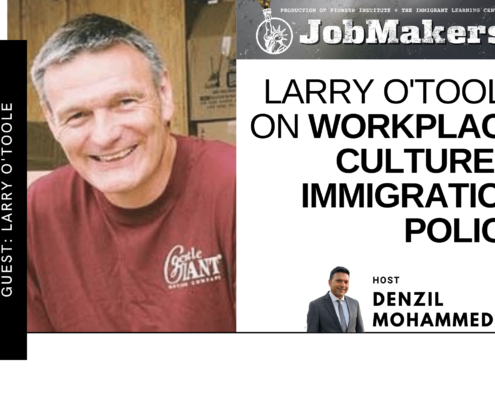
Larry O’Toole on Workplace Culture & Immigration Policy

Amar Sawhney on Sikhs, STEM & COVID
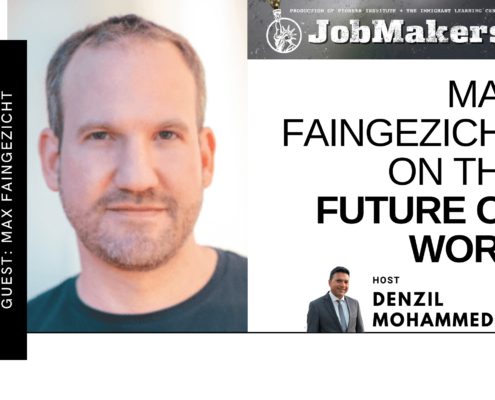
Max Faingezicht on the Skills Gap & the Future of Work
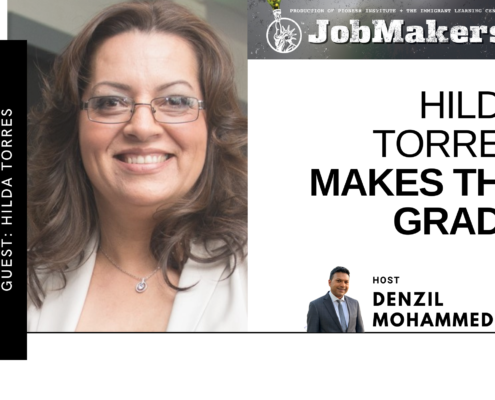
Hilda Torres Makes the Grade

Hong Tran Goes from Refugee to Realtor
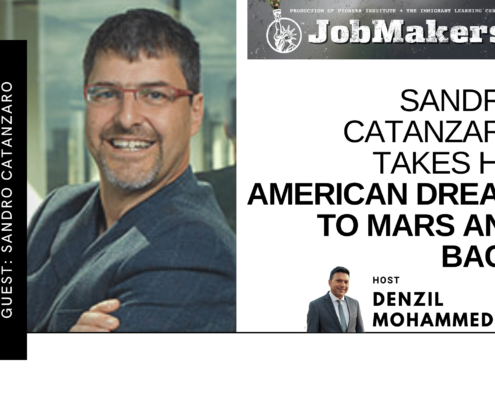
Sandro Catanzaro Takes His American Dream to Mars and Back


